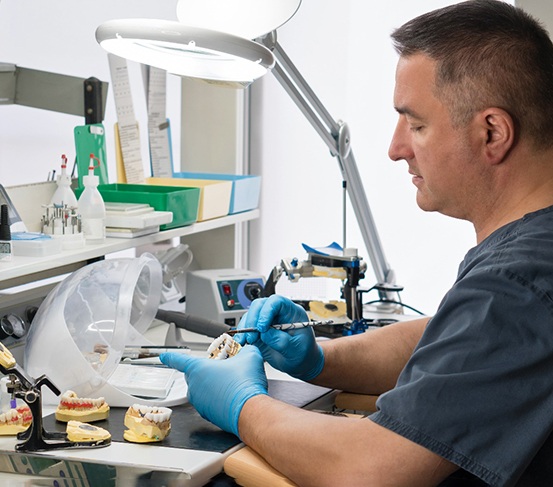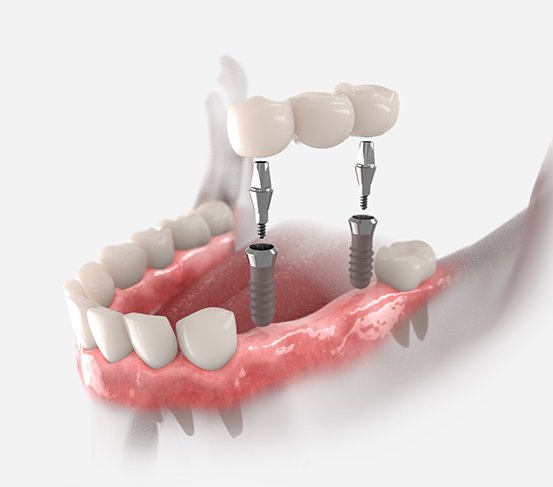Dental Bridges—North Raleigh, NC
Bridging Gaps Left by Missing Teeth
If you’re dealing with a gap in your smile caused by a missing tooth, it’s time to consider a dental bridge. Just one missing tooth can change the overall dynamics of your teeth and your bite as well as present oral health issues. Existing teeth may shift and rotate into the open space in order to balance biting forces across the remaining teeth, and jawbone atrophy and gum disease can cause additional tooth loss in as few as four to eight years.
You don’t have to live with a missing tooth, or the diminished self-esteem and chewing, speaking, and biting problems that occur. Dr. Philip Lisk offers bridgework as a part of his restorative dentistry therapies at our North Raleigh dental practice.
Why Choose Dr. Philip A. Lisk for Dental Bridges?
- High-Quality, Durable Dental Restorations
- Welcoming & Friendly Dental Office
- Reliable, Detail-Oriented Dentist
What are Dental Bridges?

Dental bridges are custom-crafted prosthetics that are comprised of two major parts: the pontics, which are free-standing replacement teeth, and the crowns that anchor the bridge to the mouth. Each bridge is custom-crafted from high-quality dental materials that look natural, like porcelain and ceramic, ensuring your prosthetic flawlessly incorporates with your surrounding teeth.
Types of Dental Bridges

Once Dr. Lisk has had a chance to examine your mouth and speak with you about your smile goals, our team will be able to walk you through your tooth replacement options, which could include one of the two treatments below.
Traditional Dental Bridges
A fixed bridge utilizes two healthy teeth adjacent to the missing one and are referred to as abutment teeth. The prosthetic tooth, or pontic, is fused between these abutment teeth forming a bridge to span the gap. Fixed bridges are fabricated using different types of material including metal, porcelain, or a combination of both.
Implant Bridges
Implant bridges are an excellent option for patients who don’t want to have to alter the structure of their natural teeth to support the prosthetic. Instead of being anchored to abutment teeth, implant bridges are secured to small posts that are surgically placed below the gumline and into the jawbone. This provides your replacement teeth with additional strength, support, and stability.
The Benefits of Getting a Dental Bridge

When you replace a missing tooth, you’re doing more than just closing the gap. A fixed bridge can offer improved biting and chewing function. Because the bite is balanced, surrounding jaw and facial muscles don’t have to work as hard easing headaches, jaw soreness, and facial pain. A fixed bridge also keeps existing teeth from shifting and supports the internal structures of the face for a more youthful appearance.
If you, or someone in your family, is in need of an excellent tooth replacement option, consider a fixed bridge from our North Raleigh dentistry practice. Dr. Lisk will provide a comprehensive examination and consultation to help you determine the right tooth replacement option. We may also make additional recommendations for your smile, including cosmetic dentistry for enhancements or general dentistry therapies to improve function. Contact us to schedule your appointment today.
Dental Bridge FAQs

Are you missing single or multiple teeth and aren’t sure which tooth replacement is right for you? People often turn to dental bridges for a variety of reasons, including their relative affordability compared to other tooth replacement solutions. Of course, we understand if you still have questions about this treatment option. Feel free to review some of the most common questions we have heard about dental bridges below to learn more ahead of your first appointment with Dr. Lisk.
Is getting a dental bridge painful?
Prior to preparing your teeth to receive a bridge, we’ll make sure to sufficiently numb the teeth before they are modified. This is easy to do with a topical anesthetic, but if you are particularly nervous or fearful ahead of treatment, we can also administer nitrous oxide sedation. Once the teeth are modified and the bridge has been placed, you can expect to feel some mild sensitivity over the next few days. Taking over-the-counter pain medications can help with this; just be sure to call us if your symptoms do not improve. Bridges stop teeth from drifting out of place and prevent discomfort later on as a result of this dental drift.
Is a partial denture the same as a bridge?
Partial dentures are not the same as bridges because bridges are not designed to be removed once they are placed. In fact, bridges are meant to stay fixed indefinitely (that is, until they require replacement). Bridges should only be removed by a dentist, while partial dentures can be taken out by patients at any time. Additionally, bridges can only replace a few consecutive teeth at a time whereas partials can bring back several teeth at various points along the arch (including opposite sides of the mouth). Bridges also rely on modified teeth to remain in place, while partial dentures contain metal clips or clasps that wrap around existing teeth.
How long should a dental bridge last?
A dental bridge can last anywhere between five and 15 years depending on the materials they are made up and how well you take care of them. Metal bridges tend to last longer than non-metal ones, but this is not necessarily a guarantee. In many cases, their difference is negligible. The lifespan of your bridge can also vary based on your diet, oral hygiene, and poor habits like using tobacco, chewing on ice cubes, and using your teeth as a tool. The location of the bridge can also determine lifespan as bridges on the front teeth may last slightly longer than those toward the back of the mouth. Teeth in the back of the mouth are more subject to wear and tear compared to teeth in the front. If you’re concerned about longevity, it may be worth it to consider dental implants to support your bridge.
Do dental bridges feel natural?
After your bridge is placed, it should start to feel increasingly natural after a few days. Basic tasks like chewing food, speaking, and smiling should not feel strange. All bridges are custom-made to fit your mouth exactly to ensure this would be the case. This will also allow your bridge to blend in with your existing teeth quite well.
I Need a Checkup & Cleaning I am Worried about Bleeding Gums I Have a Cavity or Broken Tooth I am Missing One or More Teeth I Want to Improve My Smile I am Scared of the Dentist I Want to Learn about Sleep Apnea I am Experiencing Neck/Jaw Pain I am in Pain & Need Help View Our Services

